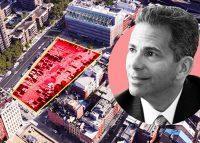If any pigs were seen flying over Lower Manhattan Tuesday, this would explain it: An $850 million development planned for the South Street Seaport Historic District was approved.
The third time before the fussy Landmarks Preservation Commission was the charm for the Howard Hughes Corporation as the board voted 6 to 2 in favor of its downsized — but still sizable — project at 250 Water Street.
The company’s proposal was among the most controversial in recent city history, with throngs of New Yorkers weighing in about how it would save the nearby Seaport Museum, provide affordable housing and blend in seamlessly with the historic district and Financial District on either side. Plenty of others decried the design, saying the building would overwhelm the area with its height and bulk.
More than 700 people wrote to the landmarks panel in support of the now 25-story project, according to the developer. New Yorkers testified for hours at virtual commission meetings in January and last month.
Read more


For its April 7 proposal to the commission, Howard Hughes had pared down the project by about 27 percent, to 550,000 square feet, and reduced the height to 345 feet from its original 470. Since then the developer has trimmed it a bit more, to 324 feet, and shaved off another 10,000 square feet. That reduction helped secure the six votes it needed from the height-conscious commission.
The number of apartments remains the same as in the previous proposal, but was previously cut from 360 (including 100 affordable units) to 270 apartments (with 70 affordable). The developers will, as before, provide long-term financial support for the Seaport Museum, but Howard Hughes now says there is “no set number” for how much. It had pledged $50 million before the size reduction, which allows for less profit to subsidize affordable housing and the museum.
The project still needs City Council approval and will begin that process this month so that it can conclude before the local Council member, Margaret Chin, leaves office at the end of the year. Chin supports the proposal, and the rest of the chamber is certain to fall in line with her.
The council member’s support stems from the financial commitment to the long-struggling museum and the income-restricted apartments, which will be affordable to households earning an average of just 40 percent of the area median income.
Chin also knew that if denied approval, Howard Hughes had vowed to build a 160-foot-tall structure with no affordable units or subsidy for the museum. The developer has been working on the project for more than two years, and efforts to build something on what is now a parking lot at 250 Water Street date back decades.
In a statement, Howard Hughes executive Saul Scherl said, “We worked hard to produce a design that is responsive to the commission’s comments and preserves the project’s crucial benefits: deeply affordable housing in one of the city’s wealthiest neighborhoods and meaningful funding for the South Street Seaport Museum.”
